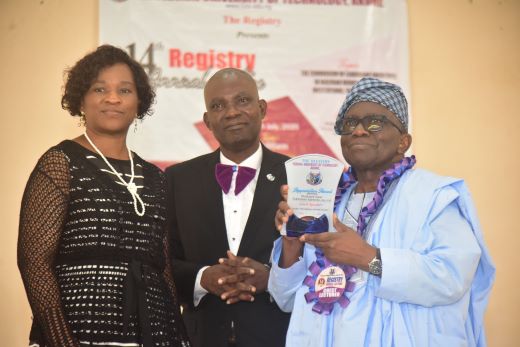Former UI Vice-Chancellor and ex-Minister of Health, Professor Isaac Adewole, has decried the influence of ethnicity and political considerations in the emergence of leadership in Nigeria’s higher education institutions.
Delivering the 14th Registry Annual Lecture of the Federal University of Technology, Akure (FUTA) on July 24, 2025, Adewole, who also served as the 11th Vice-Chancellor of the University of Ibadan, described the flawed leadership selection process in higher institutions as a reflection of broader governance failures in the country.
Speaking on the theme “Conundrum of Leadership Emergence in Nigerian Higher Education Institutions: The Missing Links,” the medical professor identified political, ethnic, and regional considerations as key obstacles to merit-based leadership appointments. He, however, emphasized that with structural reforms, capacity building, and a renewed commitment to transparency and meritocracy, visionary leadership capable of transforming the academic landscape is still achievable.
“One of the major challenges in the leadership selection process is that political considerations often take precedence over merit,” he said. “Patronage, favoritism, and external pressures compromise the integrity of the selection process, often resulting in the appointment of individuals who lack the necessary vision or competence.”
Professor Adewole added that ethnic and regional loyalties have further undermined credible leadership. “Nigeria’s rich ethnic diversity, while a strength, has also bred intense competition and factionalism within institutions,” he noted. “Leadership struggles are frequently influenced by regional allegiances, which undermine unity and institutional collaboration.”
He also criticized the absence of leadership development and succession planning in many higher institutions. “Few Nigerian higher education institutions have structured leadership development programs. As a result, leadership emergence is informal, reactive, and more reliant on mentorship than systematic training,” he said.
To address these issues, Adewole proposed a multi-pronged approach, advocating for transparent, merit-based selection processes. He urged Governing Councils to thoroughly evaluate Vice-Chancellor appointments and suggested orientation and training between appointment and assumption of office to enhance preparedness. “This period should also focus on developing a strategic plan with clear, measurable objectives,” he said.
He further called on the Committee of Vice-Chancellors (CVC), the Association of Vice-Chancellors of Nigerian Universities (AVCNU), and the National Universities Commission (NUC) to jointly oversee leadership preparation. “Without this, new leaders may become overly reliant on specialists,” he warned.
Adewole emphasized the importance of impartiality in the selection process, suggesting that outgoing Vice-Chancellors should be distanced from the process to preserve fairness. He also urged Registrars to act as institutional memory and provide unbiased counsel to councils.
He argued for a new charter that redefines the roles of universities within Nigeria, noting that the autonomy of universities has been steadily eroded. “Politicization of Governing Councils, declining funding, centralized admissions, uniform salary scales, and religious interference have all contributed to the loss of academic freedom and innovation,” he said.
In his concluding remarks, Adewole stated, “The leadership conundrum in Nigerian universities is symptomatic of deeper systemic dysfunctions. At its core is the absence of a coherent, merit-based, and future-oriented framework for leadership development and selection. Addressing this gap is essential for revitalizing Nigeria’s higher education system.”
He called for reforms that promote meritocracy, institutional autonomy, and strategic leadership planning. “With transparency, inclusiveness, and investment in leadership training, Nigerian higher education institutions can become global models of excellence,” he added.
Earlier in the event, the Registrar and Chief Host, Mr. Charles Adeleye, stated that the lecture was crucial to ongoing conversations about higher education reform and institutional governance. “The Registry Annual Lecture has become a valuable platform for intellectual reflection and the continuous development of administrative best practices within our institutions,” he said.
The Vice-Chancellor, Professor Adenike Oladiji, praised the Registrar and Registry staff for sustaining the lecture tradition. “This occasion marks another milestone in our intellectual and administrative culture. It urges us to interrogate not just the nature of leadership but the principles guiding its emergence,” she said. “FUTA remains committed to building a leadership culture rooted in integrity, professionalism, and academic excellence. The Registry is central to this transformation.”
Also speaking, the Chairman of the Local Organising Committee, Mr. Isaac Fafila, described the lecture as pivotal to the growth of registries in higher education. He noted that the calibre of past speakers, including Professor Adewole, had elevated the FUTA Registry Annual Lecture into a flagship platform for policy dialogue in Nigeria’s education system.


